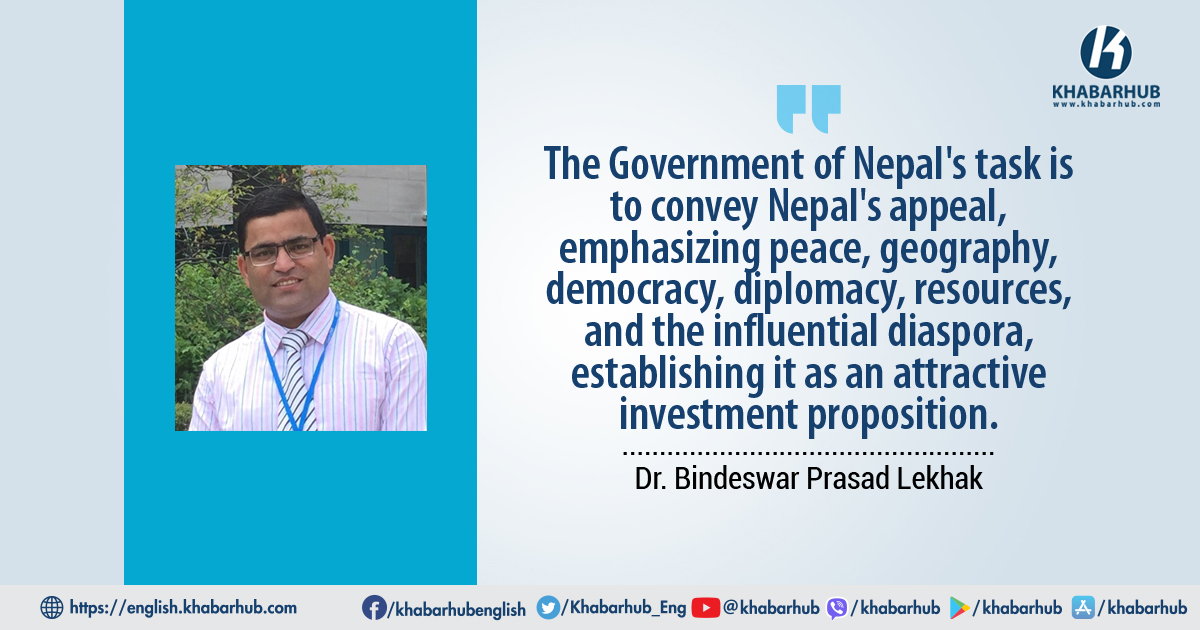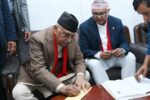The 2023 World Investment Report underscores a significant global surge in Foreign Direct Investment (FDI) inflows.
However, Nepal’s FDI inflows fluctuated, ranging from US$198 million in 2017 to US$65 million in 2022. In contrast, the FDI stock shows a positive trend, rising from US$72 million in 2000 to US$2040 million in 2022, with India and China contributing 33.5 percent and 12.7 percent, respectively.
Nepal’s FDI landscape raises critical questions about policy, institutions, and global governance participation. From a policy standpoint, Nepal exhibits positive attributes.
The Constitution, particularly Article 51, embraces the ‘Three Pillars Economic Policy.’ Legislation such as the Foreign Investment and Technology Transfer Act, Public-Private Partnership and Investment Act, Industrial Enterprises Act, and other policies such as the Foreign Investment Policy, Trade Logistic Policy, Commerce Policy, and Industrial Policy collectively create an attractive environment for FDI.
Institutionally, Nepal boasts robust support structures. Ministries and entities like Nepal Rastra Bank, Investment Board Nepal, One Stop Service Centre, Special Economic Zone Authority, and global diplomatic missions strengthen Nepal’s appeal for FDI.
Furthermore, investors carefully evaluate elements such as policy stability, challenges related to trade unions, the efficiency of trade facilitation and connectivity, the robustness of bureaucratic processes, the willingness and coordination patterns within the private sector, geopolitical considerations, market size, potential for exporting production goods, the soundness of the banking and financial sector, and performance on various key indicators related to the ease of doing business.
Furthermore, Nepal has made international commitments that contribute to its favorable investment climate. These include World Trade Organization membership, Multilateral Investment Guarantee Agency affiliation, Double Taxation Avoidance Agreements, and Bilateral Investment Promotion and Protection Agreements.
Nepal actively participates in global forums such as the United Nations, World Bank, International Monetary Fund, Asian Development Bank, Asian Infrastructure Investment Bank, Bay of Bengal Initiative for Multi-Sectoral Technical and Economic Cooperation (BIMSTEC), and South Asian Free Trade Area (SAFTA).
Regarding connectivity initiatives, Nepal has strategically engaged in projects such as the Trans-Himalayan Multi-Dimensional Connectivity, Asian Highway, and Trans-Asian Railway.
Agreements such as the Bangladesh, Bhutan, India, Nepal (BBIN) Initiative, the Treaty of Transit and Rail Services Agreement with India, and a Transit Transport Agreement with China further enhance Nepal’s position in transit and connectivity scenarios.
In addition to the instrumental mechanisms in place, the question arises: why does Nepal struggle to attract FDI at a level commensurate with its potential?
The answer is multifaceted. Prospective foreign investors meticulously scrutinize various facets of the target country before committing capital.
Factors under scrutiny include the efficacy of political leadership, the coherence of economic agendas among political leaders, the prevalence of corruption, levels of voice and accountability, the integrity of the rule of law, the effectiveness of government institutions, and the overall legal framework.
According to the World Bank’s Doing Business Report, Nepal ranks 94th in 2020. Starting a business became more challenging in Nepal; investors face eight procedures and 22.5 days to initiate a business.
Furthermore, investors carefully evaluate elements such as policy stability, challenges related to trade unions, the efficiency of trade facilitation and connectivity, the robustness of bureaucratic processes, the willingness and coordination patterns within the private sector, geopolitical considerations, market size, potential for exporting production goods, the soundness of the banking and financial sector, and performance on various key indicators related to the ease of doing business.
Examining the specific challenges faced by Nepal, various scenarios come to the forefront. The country grapples with a lack of clear, long-term common economic agendas from political parties, fostering uncertainty for foreign investors.
Furthermore, policy instability exacerbates the situation. For instance, the Nepal Rastra Bank adjusted the FDI threshold from Rs. 50 lakh to Rs. 5 crores in May 2022, subsequently revising it to Rs. 2 crores in September 2022.
These fluctuations prompt investors to scrutinize the sustainability of the Government of Nepal’s (GoN) incentive policies across various sectors.
Weak governance impedes FDI attraction. Transparency International ranks Nepal 110th out of 180 countries on the corruption perceptions index.
The World Bank’s governance indicators reveal Nepal’s weaknesses, notably in the government effectiveness index, control of corruption, and the rule of law.
The underutilization of the Non-Resident Nepali (NRN) community and a suboptimal project management scenario are additional factors that diminish Nepal’s appeal for prospective FDI.
According to the World Bank’s Doing Business Report, Nepal ranks 94th in 2020. Starting a business became more challenging in Nepal; investors face eight procedures and 22.5 days to initiate a business.
The Paying Taxes index places Nepal at 175th, demanding 377 hours yearly for tax payments, with a total tax and contribution rate of 41.8 percent of profit.
The Nepalese private sector shares the blame, prioritizing profit over cooperative culture, corporate ethics, and foreign investment openness.
Notably, the sector opposed GoN’s 2021 decision to permit FDI in agriculture, as seen in the case of Indian dairy industry leader Amul.
Furthermore, Nepal grapples with many challenges that significantly impede its allure for FDI.
Deficiencies in internal connectivity mechanisms and infrastructures, spanning Special Economic Zones, One Stop Service Centre, Integrated Check Posts, and Dry Ports, coupled with the nation’s transit connectivity heavily leaning on India, along with frail links to Chinese boundaries, pervasive labor issues in the industrial sector, and intricate geographical complexities, collectively contribute to a compromised FDI landscape.
Moreover, this predicament is further aggravated by weak economic diplomacy, lackluster performance in global governance forums, an absence of coordination among diverse sectors and agencies, and constrained export diversification.
Beyond these measures, the government places a premium on elevating economic diplomacy, leveraging the global influence of the NRN community, fostering dynamic public-private partnerships, automating tax and customs systems, mitigating trade union challenges, and implementing robust project management systems.
The underutilization of the Non-Resident Nepali (NRN) community and a suboptimal project management scenario are additional factors that diminish Nepal’s appeal for prospective FDI.
Elevating Nepal’s socio-economic standing by attracting heightened FDI is the central imperative in the prevailing landscape.
In response, nuanced policy measures must be strategically deployed across multifarious sectors. Although the commitment of Nepalese political parties towards fortifying the nation’s economic framework is indisputable, the exigencies of the current era demand a unified, comprehensive, and enduring economic agenda to propel the country steadfastly forward.
In parallel, Nepal’s private sector is tasked with a transformative journey toward a more resilient corporate culture, fostering symbiotic relationships with global investors to magnetize augmented FDI.
Furthermore, the private sector is urged to proactively furnish the GoN with judicious suggestions and timely feedback, thereby underscoring an unwavering commitment to propel Nepal’s economy into uncharted realms of prosperity.
In pursuit of advancing Nepal’s governance landscape, the GoN has strategically undertaken a comprehensive array of initiatives.
These encompass a targeted focus on curbing corruption, fortifying voice and accountability mechanisms, and enforcing the rule of law across diverse sectors. Concurrently, the GoN recognizes the imperative of sustaining policy stability for trade and investment incentives.
While it is not a panacea, the summit strategically catalyzes FDI. The GoN’s task is to convey Nepal’s appeal, emphasizing peace, geography, democracy, diplomacy, resources, and the influential diaspora, establishing it as an attractive investment proposition.
Beyond these measures, the government places a premium on elevating economic diplomacy, leveraging the global influence of the NRN community, fostering dynamic public-private partnerships, automating tax and customs systems, mitigating trade union challenges, and implementing robust project management systems.
Collectively, these initiatives serve to fortify Nepal’s FDI mechanism.
The GoN adopts a holistic strategy within the infrastructure and connectivity domain.
This involves optimizing internal road networks for year-round accessibility, ensuring a reliable power supply, and negotiating with India for access to additional seaports such as Dhamra Port in Odisha and Mundra Port in Gujarat.
Moreover, a strategic focus on enhancing connectivity with China and fortifying border infrastructures is pivotal to solidifying Nepal’s land link.
To bolster Nepal’s global presence, the government strategically positions itself within key global governance forums, employing sophisticated advocacy strategies.
These meticulously crafted policy measures collectively drive Nepal’s FDI scenario toward a transformative epoch.
The GoN is diligently preparing for the Nepal Investment Summit 2024 in Kathmandu in April, with the aim of attracting global investors.
While it is not a panacea, the summit strategically catalyzes FDI. The GoN’s task is to convey Nepal’s appeal, emphasizing peace, geography, democracy, diplomacy, resources, and the influential diaspora, establishing it as an attractive investment proposition.









Comment